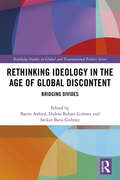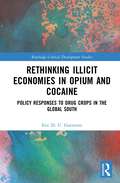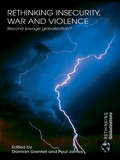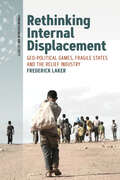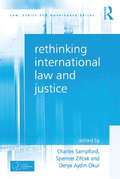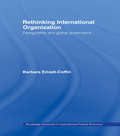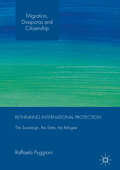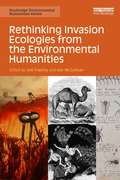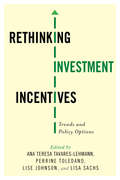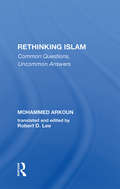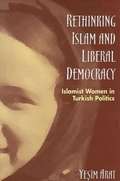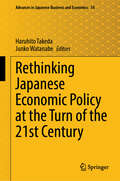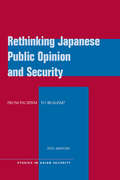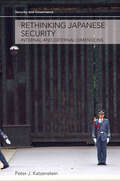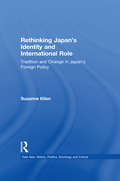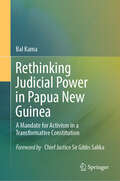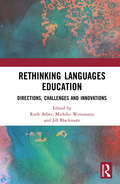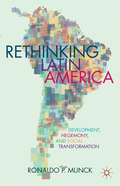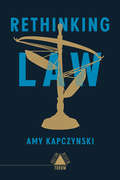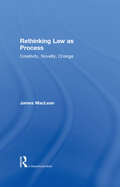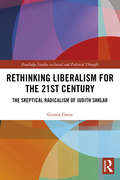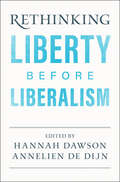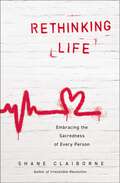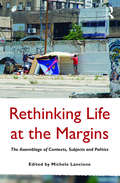- Table View
- List View
Rethinking Ideology in the Age of Global Discontent: Bridging Divides (Routledge Studies in Global and Transnational Politics)
by Barrie Axford Didem Buhari-Gulmez Seckin Baris GulmezOver the last decade, anti-government demonstrations worldwide have brought together individuals and groups that were often assumed unlikely to unite for a common cause due to differences in ideological tendencies. They have particularly highlighted the role of youth, women, social media, and football clubs in establishing unusual alliances between far left and far right groups and/or secular and religious segments of the society. In this wide-ranging volume, the contributors question to what extent political ideologies have lost their explanatory power in contemporary politics and society. This book aims to contribute to the ongoing debates about the relationship between ideology and public protests by introducing the global context that allows the comparison of societies in different parts of the world in order to reveal the general patterns underlying the global era. Tackling a highly topical issue, this book will be of particular interest to students and scholars of international relations, social movements and globalization.
Rethinking Illicit Economies in Opium and Cocaine: Policy Responses to Drug Crops in the Global South (Routledge Critical Development Studies)
by Eric D. GutierrezThis book investigates the cross-border trade in illicit drug crops in the global south. It exposes an important paradox: despite all the dangers and negative consequences of these criminal networks, in many cases, they also provide marginalised and excluded communities with important private sources of protection, investment, and employment. This book reconstructs and compares socioeconomic contexts, criminal careers, and changes in farmgate prices of illicit coca and opium poppy crops in Afghanistan, Myanmar, Colombia, and Bolivia. It investigates the politics of strange bedfellows; informal bankers-without-suits providing cross-border financial services to the undocumented and the unbanked; the criminals without borders; and the mystery of illicit crop prices. The book challenges commonly held assumptions and casts new light on how relationships of conflict and accommodation are arranged and re-arranged in fluid, ever-changing contexts, producing often paradoxical outcomes. It then suggests policy reforms and alternative approaches to drug policy, development aid, and peacebuilding work. Researchers and students across development, peacebuilding, illicit economies, and conflict studies will find this book an important source of original research and analysis. It will also be useful for politicians, commentators and public officials considering what to do differently in tackling illicit drug economies.
Rethinking Insecurity, War and Violence: Beyond Savage Globalization? (Rethinking Globalizations #Vol. 15)
by Damian Grenfell Paul JamesRethinking Insecurity, War and Violence: Beyond Savage Globalization? is a collection of essays by scholars intent on rethinking the mainstream security paradigms. Overall, this collection is intended to provide a broad and systematic analysis of the long-term sources of political, military and cultural insecurity from the local to the global. The book provides a stronger basis for understanding the causes of conflict and violence in the world today, one that adds a different dimension to the dominant focus on finding proximate causes and making quick responses Too often the arenas of violence have been represented as if they have been triggered by reassertions of traditional and tribal forms of identity, primordial and irrational assertions of politics. Such ideas about the sources of insecurity have become entrenched in a wide variety of media sources, and have framed both government policies and academic arguments. Rather than treating the sources of insecurity as a retreat from modernity, this book complicates the patterns of global insecurity to a degree that takes the debates simply beyond assumptions that we are witnessing a savage return to a bloody and tribalized world. It will be of particular interest to students and scholars of international relations, security studies, gender studies and globalization studies.
Rethinking Internal Displacement: Geo-political Games, Fragile States and the Relief Industry (Humanitarianism and Security #1)
by Frederick LakerInternal displacement has become one of the most pressing geo-political concerns of the twenty-first century. There are currently over 45 million internally displaced people worldwide due to conflict, state collapse and natural disaster in such high profile cases as Syria, Yemen and Iraq. To tackle such vast human suffering, in the last twenty years a global United Nations regime has emerged that seeks to replicate the long-established order of refugee protection by applying international law and humanitarian assistance to citizens within their own borders. This book looks at the origins, structure and impact of this new UN regime and whether it is fit for purpose.
Rethinking International Law and Justice (Law, Ethics And Governance Ser.)
by Charles Sampford Spencer ZifcakGeneral principles of law have made, and are likely further to make, a significant contribution to our understanding of the constituent elements of global justice. Dealing extensively with global headline issues of peace, security and justice, this book explores justice arising in specific areas of international law, as well as underlying theories of justice from political science and international relations. With contributions from leading academics and practitioners, the book adopts an interdisciplinary approach. Covering issues such as international humanitarian law, and examining the significance of non-state actors for the development of international law, the collection concludes with the complex question of how best to rethink aspects of international justice. The lessons derived from this research will have wide implications for both developed and emerging nation-states in rethinking sensitive issues of international law and justice. As such, this book will be of interest to academics and practitioners interested in international law, environmental law, human rights, ethics, international relations and political theory.
Rethinking International Organisation: Deregulation and Global Governance (Routledge Advances in International Political Economy #Vol. 9)
by Barbara Emadi-CoffinThe function of the state as a symbol of identity has become increasingly important as major powers of the pre-Cold War era have given way to self-determination. The conventional role of the state has, however, simultaneously been challenged by the process of globalisation which transcends such national boundaries. Barbara Emadi-Coffin seeks to explain this contradiction through a radical new theory. There are now 37,000 multinational corporations in the world, many of which are increasingly seen as being among the new centres of political and economic power. Barbara Emadi-Coffin analyses the increasing interaction of multinational corporations, international organizations and transnational interest groups, such as Greenpeace and Amnesty International, in processes of the global political economy. Using examples of the free trade zones in Korea, the UK and the People's Republic of China, the author demonstrates these interactions. In so doing, she challenges prevailing notions surrounding International Organization theory.
Rethinking International Protection
by Raffaela PuggioniThis book provides a critical account of the concept of international protection. The author questions the boundaries between protection and assistance, and challenges the dominant focus on state sovereignty. Drawing upon a broad range of sources, she scrutinises the central role played by the state in providing legal, social and economic protection, which entails positive obligations upon the state. Protection, in this context, does not simply mean protection from persecution, threats, and sustained violence, but emancipation. By focusing on the local and national contexts wherein protection is enacted, created and also contested, she combines the politics of protection with the practices of protection, with a special focus on Italy. The resulting arguments clarify the difference between the public responsibility to protect and the private desire to assist, between treating refugees as bearers of rights and considering them as objects of assistance. The author argues that the absence of protection in Italy has encouraged many to leave and find protection in other EU countries. This timely work is essential reading for students and scholars of migration, international relations and asylum politics as well as policy-makers.
Rethinking International Protection: The Sovereign, the State, the Refugee (Migration, Diasporas and Citizenship)
by Raffaela PuggioniThis book provides a critical account of the concept of international protection. The author questions the boundaries between protection and assistance, and challenges the dominant focus on state sovereignty. Drawing upon a broad range of sources, she scrutinises the central role played by the state in providing legal, social and economic protection, which entails positive obligations upon the state. Protection, in this context, does not simply mean protection from persecution, threats, and sustained violence, but emancipation. By focusing on the local and national contexts wherein protection is enacted, created and also contested, she combines the politics of protection with the practices of protection, with a special focus on Italy. The resulting arguments clarify the difference between the public responsibility to protect and the private desire to assist, between treating refugees as bearers of rights and considering them as objects of assistance. The author argues that the absence of protection in Italy has encouraged many to leave and find protection in other EU countries. This timely work is essential reading for students and scholars of migration, international relations and asylum politics as well as policy-makers.
Rethinking Invasion Ecologies from the Environmental Humanities: Rethinking Invasion Ecologies From The Environmental Humanities (Routledge Environmental Humanities)
by Iain McCalman Jodi FrawleyResearch from a humanist perspective has much to offer in interrogating the social and cultural ramifications of invasion ecologies. The impossibility of securing national boundaries against accidental transfer and the unpredictable climatic changes of our time have introduced new dimensions and hazards to this old issue. Written by a team of international scholars, this book allows us to rethink the impact on national, regional or local ecologies of the deliberate or accidental introduction of foreign species, plant and animal. Modern environmental approaches that treat nature with naïve realism or mobilize it as a moral absolute, unaware or unwilling to accept that it is informed by specific cultural and temporal values, are doomed to fail. Instead, this book shows that we need to understand the complex interactions of ecologies and societies in the past, present and future over the Anthropocene, in order to address problems of the global environmental crisis. It demonstrates how humanistic methods and disciplines can be used to bring fresh clarity and perspective on this long vexed aspect of environmental thought and practice. <P><P>Students and researchers in environmental studies, invasion ecology, conservation biology, environmental ethics, environmental history and environmental policy will welcome this major contribution to environmental humanities.
Rethinking Investment Incentives: Trends and Policy Options
by Ana Teresa Tavares-Lehmann Lisa Sachs Lise Johnson Perrine ToledanoGovernments often use direct subsidies or tax credits to encourage investment and promote economic growth and other development objectives. Properly designed and implemented, these incentives can advance a wide range of policy objectives (increasing employment, promoting sustainability, and reducing inequality). Yet since design and implementation are complicated, incentives have been associated with rent-seeking and wasteful public spending.This collection illustrates the different types and uses of these initiatives worldwide and examines the institutional steps that extend their value. By combining economic analysis with development impacts, regulatory issues, and policy options, these essays show not only how to increase the mobility of capital so that cities, states, nations, and regions can better attract, direct, and retain investments but also how to craft policy and compromise to ensure incentives endure.
Rethinking Islam: Common Questions, Uncommon Answers
by Robert D. Lee Mohammed ArkounA Berber from the mountainous region of Algeria, Mohammed Arkoun is an internationally renowned scholar of Islamic thought. In this book, he advocates a conception of Islam as a stream of experience encompassing majorities and minorities, Sunni and Shi'a, popular mystics and erudite scholars, ancient heroes and modern critics. A product of Islamic
Rethinking Islam and Liberal Democracy: Islamist Women in Turkish Politics
by Yesim AratIn Turkey, no secular party has approximated the high levels of membership and intense activism of women within the Islamist Refah (Welfare) Party. Rethinking Islam and Liberal Democracy examines the experiences of these women, who represented an unprecedented phenomenon within Turkish politics. Using in-depth interviews, Yesim Arat reveals how the women of the party broadened the parameters of democratic participation and challenged preconceived notions of what Islam can entail in a secular democratic polity. The women of the party successfully mobilized large groups of allegedly apolitical women by crossing the boundaries between the social and the political, reaching them through personal networks cultivated in private spaces. The experiences of these women show the contentious relationship between liberal democracy and Islam, where liberalism that prioritizes the individual can transform, coexist, or remain in tension with Islam that prioritizes a communal identity legitimized by a sacred God.
Rethinking Japanese Economic Policy at the Turn of the 21st Century (Advances in Japanese Business and Economics #34)
by Haruhito Takeda Junko WatanabeThis book, focusing on the Japanese economy mainly from the 1990s to the 2010s, examines the Japanese industrial and fiscal-monetary policies and evaluates its achievements and limits from a historical perspective. Although the period that was also referred to as the "lost decade (or two, three decades)" was marked by various policy discussions, there are still few studies that summarize them as a history. Another unique feature of this publication is that it includes the contributions not only from researchers, but also from those who are/were in a position close to the policy makers. By rethinking this era, many Japanese not just researchers and policy makers will be motivated to move toward a new era. Many of the chapters in the book are based on the primary sources not found elsewhere, including the interviews with policymakers and collection of policy documents, in addition to the authors' own analysis, views, and findings. They attempt to describe policymakers’ struggles to exit from the long-term recession after the collapse of the bubble economy, seeking to get back on the trajectory for economic growth. The readers will gain new factual perceptions and discoveries from these historical contexts. The issues presented in this book will also contribute to the international understanding of policy efforts in Japan, which is facing a frontier with high uncertainty. Japan's experience and its challenges are common in many aspects to developed countries now and in the future.
Rethinking Japanese Public Opinion and Security
by Paul MidfordPart of a series of peer reviewed works on national and regional security issues in Asia, this volume examines the role of Japanese public opinion in the formation and execution of national security policies. Drawing on a large pool of available, previously un-analyzed public opinion data, this study presents a discussion of the evolution of the Japanese role in international security activities, including the two Gulf Wars and international peacekeeping activities. The work includes numerous figures and tables. Midford is a professor of political science and sociology at the Norwegian University for Science and Technology at Trondheim. Annotation ©2011 Book News, Inc. , Portland, OR (booknews. com)
Rethinking Japanese Security: Internal and External Dimensions (Security and Governance)
by Peter J. KatzensteinSince the unexpected end of the Cold War, standard arguments about power politics can no longer be adopted uncritically. This has led to a renewed interest in Japan’s unusually peaceful security policy. Japan’s championing of "comprehensive security" is central to this collection. Peter J. Katzenstein’s essays explore this concept which not only encompasses traditional military concerns but also domestic aspects of security. The book's focus on counter-terrorism and national security highlights a policy approach which, over decades, Japan has developed with political patience and diplomatic finesse. These essays advocate an eclectic approach that helps in recognizing new questions and that seek to combine elements from different analytical perspectives in the exploration of novel lines of argument. Additionally, the book features an entirely new, substantial introduction that explores and elaborates the themes of the collection while bringing it up to date. This collection will be of significant interest to students and scholars of Japanese politics, security studies and international relations.
Rethinking Japan's Identity and International Role: Tradition and Change in Japan's Foreign Policy (East Asia: History, Politics, Sociology and Culture)
by Susanne KlienThis paper presents a study of Japan's international role with a special focus on its historical evolution. To that end, the following three pillars lay the necessary theoretical foundations: one, the notions of historical and political identity and a discussion of the ambivalent shapes they have taken in Japan; two, the regional context, an examination of Japan's situation with respect to Asian history as a whole, and finally, the "civilian power" concept as defined by Hanns W. Maull.
Rethinking Judicial Power in Papua New Guinea: A Mandate for Activism in a Transformative Constitution
by Bal KamaThis book examines the role and nature of the judiciary in Papua New Guinea (PNG), the first comprehensive study since the country's independence in 1975. It challenges the traditional view of the judiciary as solely a legal entity, arguing for its broader social and political functions. Critiquing assumptions inherited from British and Australian colonial thinking, it discusses how decolonisation has redefined judicial power, enabling courts to have a more transformative role. Introducing transformative constitutionalism into Australian-Pacific legal thinking, the book argues that PNG has a transformative constitution defined by its intent for reform, extensive Charter of Rights, and a liberal judiciary—features not found in other Pacific constitutions. Given the region's challenges such as corruption, political instability, and climate change, the book advocates for a more proactive role for the judiciary. It proposes a re-evaluation of the classical tripartite doctrine of separation of powers, advocating for a quadripartite model in PNG where the judiciary has a broader reformative function and the independent constitutional institutions constitute a fourth arm of government. This work makes important contributions to understandings of judicial power and constitutional law as well as other fields including comparative constitutional studies, legal history and decolonial scholarship.
Rethinking Languages Education: Directions, Challenges and Innovations
by Ruth Arber Michiko Weinmann Jill BlackmoreRethinking Languages Education assembles innovative research from experts in the fields of sociocultural theory, applied linguistics and education. The contributors interrogate innovative and recent thinking and broach controversies about the theoretical and practical considerations that underpin the implementation of effective Languages pedagogy in twenty-first-century classrooms. Crucially, Rethinking Languages Education explores established understandings about language, culture and education to provide a more comprehensive and flexible understanding of Languages education that responds to local classrooms impacted by global and transnational change, and the politics of language, culture and identity. Rethinking Languages Education focuses on questions about ways that we can develop farsighted and successful Languages education for diverse students in globalised contexts. The response to these questions is multi-layered, and takes into account the complex interactions between policy, curriculum and practice, as well as their contention and implementation. In doing so, this book addresses and integrates innovative perspectives of contemporary theory and pedagogy for Languages, TESOL and EAL/D education. It includes diverse discussions around practice, and addresses issues of the dominance of prestige Languages programs for ‘minority’ and ‘heritage’ languages, as well as discussing controversies about the current provision of English and Languages programs around the world.
Rethinking Latin America
by Ronaldo MunckLatin America is assuming an increasingly important position on the world stage with its heterodox economic policies and bold political experiments attracting world-wide attention in an era characterized by a general crisis of perspectives. Since European colonization from 1500 onwards, the region has played a key role in the modernization and enrichment of Europe and the West. Today, the West is in crisis and the whole Enlightenment discourse is thrown into question. Is it possible that Latin America now shows the West where it is heading? With complex, dynamic, conflictual, but, above all, original processes of development - and with new visions of social transformation and new constructions of hegemony - the region offers a fascinating laboratory for the rest of the world and, maybe, a mirror of the future.
Rethinking Law (Boston Review / Forum)
by Amy KapczynskiSome of today&’s top legal thinkers consider the ways that legal thinking has bolstered—rather than corrected—injustice.Bringing together some of today&’s top legal thinkers, this volume reimagines law in the twenty-first century, zeroing in on the most vibrant debates among legal scholars today. Going beyond constitutional jurisprudence as conventionally understood, contributors show the ways in which legal thinking has bolstered rather than corrected injustice. If conservative approaches have been well served by court-centered change, contributors to Rethinking Law consider how progressive ones might rely on movement-centered, legislative, and institutional change. In other words, they believe that the problems we face today are vastly bigger than can be addressed by litigation. The courts still matter, of course, but they should be less central to questions about social justice. Contributors describe how constitutional law supported a system of economic inequality; how we might rethink the First Amendment in the age of the internet; how deeply racial bias is embedded in our laws; and what kinds of changes are necessary. They ask which is more important: the laws or how they are enforced? Rethinking Law considers these questions with an eye toward a legal system that truly supports a just society. Contributors include Jedediah Purdy, David Grewal, Jamal Greene, Reva Siegel, Jocelyn Simonson, Aziz Rana
Rethinking Law as Process: Creativity, Novelty, Change
by James MacLeanFirst published in 2013. Routledge is an imprint of Taylor & Francis, an informa company.
Rethinking Liberalism for the 21st Century: The Skeptical Radicalism of Judith Shklar (Routledge Studies in Social and Political Thought)
by Giunia GattaRethinking Liberalism for the 21st Century offers an indispensable reexamination of the life, work, and interventions of a prominent liberal political theorist of the 20th century: Judith Shklar. Drawing on published and unpublished sources including Shklar’s correspondence, lecture notes, and other manuscripts, Giunia Gatta presents a fresh theoretical interpretation of Shklar’s liberalism as philosophically and politically radical. Beginning with a thorough reconstruction of Shklar’s life and her interest in political theory, Gatta turns her attention to examining the tension between Shklar’s critique of the term "modernity" and her passion for Enlightenment thinkers, including Rousseau and Hegel. In the second part of the book, Gatta roots Shklar’s liberalism of permanent minorities in her work in the history of political thought, and highlights this contribution as a fundamental recasting of liberalism as the political philosophy of outsiders. She makes a compelling argument for a liberalism of permanent minorities that refuses to stand on the ground of firm foundations and, instead, is oriented by complex understandings of cruelty and fear. Rethinking Liberalism for the 21st Century is a much-needed reorientation of traditional liberal policies, allowing for a more meaningful intervention in many contemporary debates. As such, it will be of interest to scholars of political theory, the history of political thought and ideas, philosophy, international relations, and political science in general.
Rethinking Liberty before Liberalism
by Hannah Dawson Annelien De DijnOpens up new histories of freedom and republicanism by building on Quentin Skinner's ground-breaking Liberty before Liberalism nearly twenty five years after its initial publication. Leading historians and philosophers reveal the neo-Roman conception of liberty that Skinner unearthed as a normative and historical hermeneutic tool of enormous, ongoing power. The volume thinks with neo-Romanism to offer reinterpretations of individual thinkers, such as Montaigne, Grotius and Locke. It probes the role of neo-Roman liberty within hierarchies and structures beyond that of citizen and state – namely, gender, slavery, and democracy. Finally, it reassesses the relationships between neo-Romanism and other languages in the history of political thought: liberalism, conservatism, socialism, and the human rights tradition. The volume concludes with a major reappraisal by Skinner himself.
Rethinking Life: Embracing the Sacredness of Every Person
by Shane ClaiborneDrawing on Scripture, church history, and his own story, Shane Claiborne explores how a passion for social justice issues surrounding life and death--such as war, gun ownership, the death penalty, racial injustice, abortion, poverty, and the environment--intersects with our faith as we advocate for life in its totality.Many of us wonder how to think about and act on issues of life and death beyond abortion and the death penalty--yet the heated debates in our churches and the confusion of our own hearts sometimes feel overwhelming. What does a balanced, Christian view of what it means to be "pro-life" really look like?Combining stories, theological reflection, and a little wit with a Southern accent, activist Shane Claiborne explores the battle between life and death that goes back to the Garden of Eden. Shane draws on his childhood growing up in the Bible Belt, his own change of perspective on how to advocate for life, and his years of working on behalf of all people to help us:Learn from the Bible and the early church about valuing lifeDeepen our understanding of what a pro-life stance can look likeDiscover ways to discuss topics that are dividing our culture and churchesFind encouragement when we feel politically homelessRenew our hope that there is a good way forward, even in difficult times We need a new movement that stands up for life--without exceptions. This moving and incredibly timely book creates a larger framework for thinking about God's love and our faith as we embrace a consistent ethic that values human life from womb to tomb.
Rethinking Life at the Margins: The Assemblage of Contexts, Subjects, and Politics
by Michele LancioneExperimenting with new ways of looking at the contexts, subjects, processes and multiple political stances that make up life at the margins, this book provides a novel source for a critical rethinking of marginalisation. Drawing on post-colonialism and critical assemblage thinking, the rich ethnographic works presented in the book trace the assemblage of marginality in multiple case-studies encompassing the Global North and South. These works are united by the approach developed in the book, characterised by the refusal of a priori definitions and by a post-human and grounded take on the assemblage of life. The result is a nuanced attention to the potential expressed by everyday articulations and a commitment to produce a processual, vitalist and non-normative cultural politics of the margins. The reader will find in this book unique challenges to accepted and authoritative thinking, and provides new insights into researching life at the margins.
